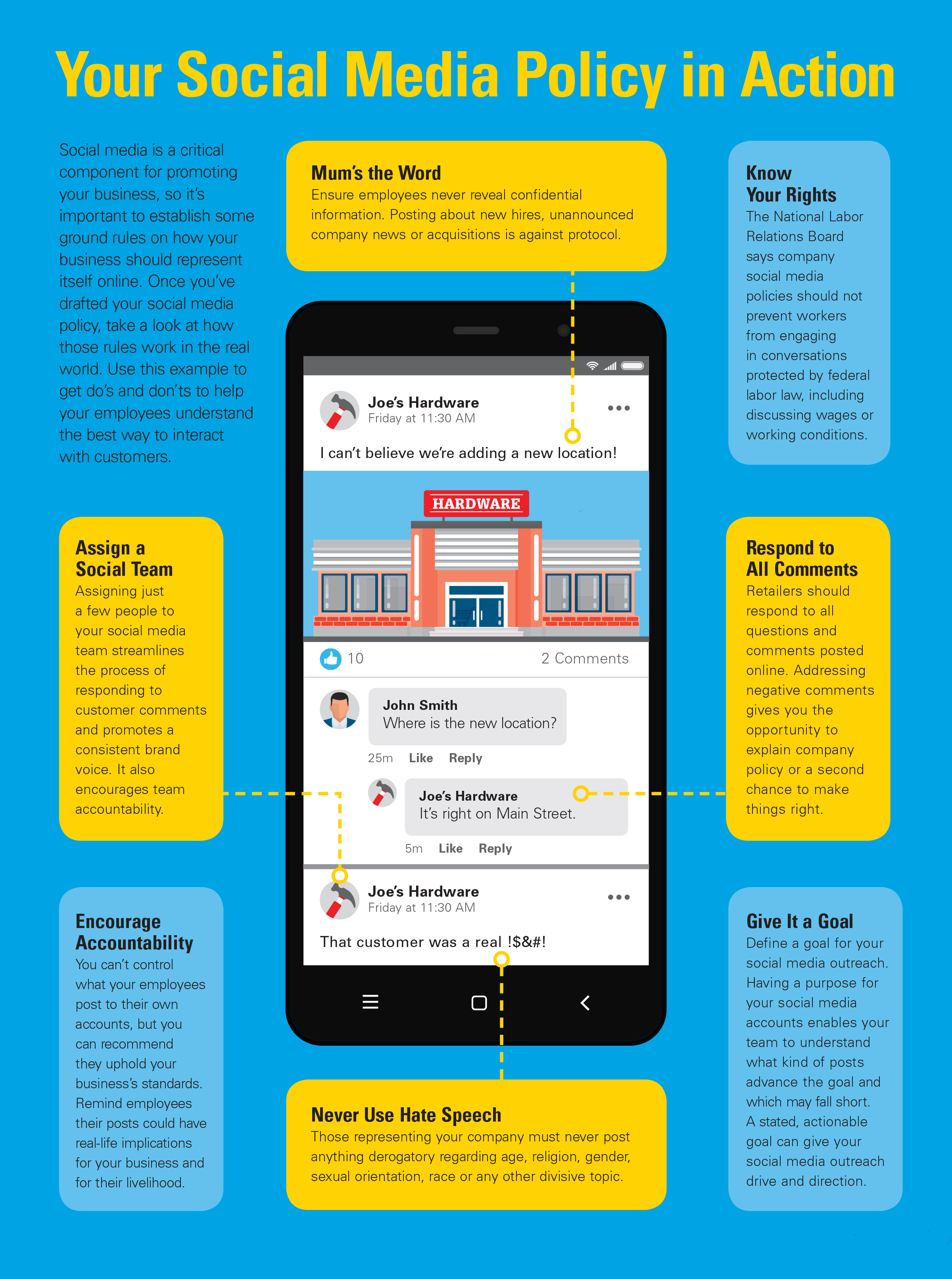Retailers have seen the lightning-fast rise of social media over the past decade. What was once an online diversion has become a key element of marketing strategies and community involvement.
Within seconds, anyone with a social media account can broadcast their thoughts and feelings to the world. A business operator must keep a sharp eye on how their company’s online strategy and their employees’ posts affect their business’s reputation in the community.
If your business doesn’t have a social media policy, you could be in line for embarrassment and potential liability. Learn the benefits of crafting a policy for your social platforms. Discover what Stacey Furtado, global social media manager of hiring website Monster, says you should consider when creating your own internal policy.
Don’t let poorly managed social media undermine years of diligence to establish your business. Safeguard your assets with a comprehensive social media policy.
5 Steps to Better Social Outreach
Furtado says it’s important for every business, regardless of industry, to implement a social media policy. Establishing one for your operation can streamline social management, helping you connect with your customers quickly and efficiently.
Furtado worked to define Monster’s social media policy and shares some of the principles that helped shape it so you can adopt best practices for your own social media guide.
1. Clearly establish guidelines.
A social media policy should fit your business’s needs and goals. If you permit employees to post through your business’s social media accounts, it’s important to establish basic posting rules.
A few clear examples for responsible posts are to never trash-talk competitors, never use hateful language and for employees to clearly indicate thoughts and comments they post as their own.
“Having a few ground rules will create a clearly defined policy that leaves no question for employees on how they should conduct themselves online,” Furtado says.
2. Enable employees, don’t handcuff them.
Furtado says that while it’s important to safeguard proprietary information about your business, you should encourage employees to share good news about the company.
“Think of your employees as a powerful extension of your company and approach your social media policy with respect and appreciation for their efforts,” she says.
The Pew Research Center says 72 percent of U.S. adults use at least one social media platform, meaning many of your employees likely have a social account and want to share the hard work they’ve invested. Don’t discourage positive, promotional posts from employees.
3. Determine who can speak to customers.
Considering how your business will react to posts made by customers and community members is a critical part of establishing your social media policy. It’s especially important for small businesses,” Furtado says.
She recommends assigning a few people on your team the power to post through your business account. Remind other employees not to post as the company in response to customer comments.
“Determining who can post online for your business helps avoid awkward situations like a customer commenting about poor service by a particular employee and that employee responding directly,” she says.
4. Plan for a crisis of any size.
As social media’s influence on retail grows, it’s important to strategize and create a plan of action for unexpected events, Furtado says.
What’s the protocol if your business closes temporarily due to inclement weather? How do you communicate information about product recalls? How will you respond to bad press about your operation? Furtado says these are all times when a preconsidered social media response is key.
“Preparing the language for all these scenarios ahead of time means you only have to worry about the specific nuances of the crisis when it hits,” Furtado says.
Any crisis communication should aim for honesty and a promise to follow up, according to Furtado.
“Customers will forgive many things, but dishonesty tends to be at the top of their list of unforgivables,” she says.
5. Take it to the next level.
Employee advocacy programs can encourage positive, on-brand social media messages about your company. These programs distribute preapproved images and text to employees across an organization to make it easier for them to share company news with their friends and family.
“The more proactive you are about getting content to your team, the easier it will be for them to share information about your brand,” she says.
Monster’s internal data shows promotional content is shared 24 times more frequently when posted by employees, not the business itself. Furtado says it’s important to not mandate employees share information, but encouraging them to do so and providing them with the necessary materials can be a positive step in social media outreach.
 A Social Media Chain of Command
A Social Media Chain of Command
Now that you’ve learned what a social media policy should look like to guide your business, take a moment to review social media plans for international chains like Target, Starbucks and Lowe’s.
 Hardware Retailing The Industry's Source for Insights and Information
Hardware Retailing The Industry's Source for Insights and Information









